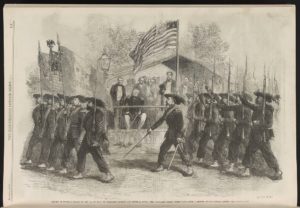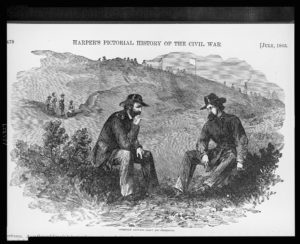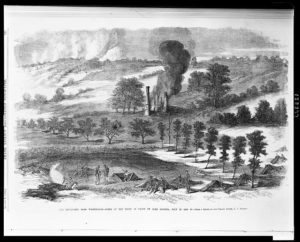By Molly Cadwell
The Lincoln family spent three summers living at the Soldiers’ Home. Each time their stay included July 4th. So how did Lincoln celebrate America’s birthday each year he was president? Communications Intern Molly Cadwell looks at Lincoln’s activities on July 4th, and also poses questions for discussion.
In 1861, the Lincolns originally planned to stay in the Cottage sometime during the summer. Mary Lincoln wrote to a friend on July 11 that within three weeks they would go to the Soldiers’ Home, “a very beautiful place.” However, with the loss at the First Battle of Bull Run, Lincoln did not deem it prudent to live away from the White House. On the fourth, Lincoln addressed a special session of Congress about the state of the War and his goals for the nation, concluding “And having thus chosen our course, without guile, and with pure purpose, let us renew our trust in God, and go forward without fear, and with manly hearts.” Later, he reviewed 20,000 troops from in front of the White House with General Winfield Scott.

Review of Federal troops on the 4th of July [1861] by President Lincoln and General Scott. Image Courtesy of the Library of Congress.
What do you think Lincoln thought the future would look like at this stage in the war? What are your visions of freedom for the future?
By the next July 4th, in 1863, President Lincoln had already completed and signed the Emancipation Proclamation, though it took time to go into full affect across the entire country (check out our post about Juneteenth to find out why). Of course, he still had a lot on his mind while staying at the Soldiers’ Home that Independence Day weekend, about two weeks after the Lincolns had moved to the Cottage. For one, Mary Lincoln had just suffered a serious carriage accident two days before, on July 2. Riding nearby the Soldiers’ Home on the way to visiting a hospital, Mary had jumped out of the carriage after her coachman had been thrown to the ground due to a loose seat, and the horses pulling the carriage had begun galloping unattended. On the 3rd, Lincoln wrote to his son Robert at Harvard “Don’t be uneasy. Your mother very slightly hurt by her fall.” However, over the next few weeks her wounds got infected, and she came close to dying. Fortunately, she was able to recover, convalescing in a room on the second floor of the Cottage.
At the same time as this personal adversity, major events which would change the course of the Civil War were occurring in both Gettysburg, Pennsylvania and in Vicksburg, Mississippi. In the East, Confederate General Robert E. Lee had marched his Army of Northern Virginia across the Potomac River north into Maryland and Pennsylvania, posing a potential threat to Washington, D.C. After three days of fighting, General Lee began his retreat to Virginia on July 3rd making the Battle of Gettysburg a Union victory. Meanwhile, in the West, Union General Ulysses S. Grant and his Army of the Tennessee had been fighting for control of the Mississippi River since the Vicksburg Campaign began back in 1862. Union troops had been laying siege to the city of Vicksburg for 47 days by the time Confederate General John C. Pemberton surrendered on July 4th, giving the Union control of the river. With all of this going on, Lincoln is reported to have remained in the telegraph office “hour after hour,” waiting to hear news of these two key battles. While Lincoln would not hear about the fall of Vicksburg until July 7th, on Independence Day he did issue a press release announcing the Union’s good position at Gettysburg, saying “the Army of the Potomac, up to 10 P.M. of the 3rd. is such as to cover that Army with the highest honor.” These two Union victories were key to eventually bringing an end to the Civil War.
What might Lincoln have been thinking about that Independence Day of 1863? How are you thinking about freedom this Independence Day of 2019?

Interview Between Grant and Pemberton. Union General Ulysses S. Grant and Confederate General John C. Pemberton discuss the terms of the surrender of Vicksburg. Image Courtesy of the Library of Congress.
On July 4th, 1864 the Lincoln family made their annual move from the White House out to the Cottage. That same day, Lincoln signed “An Act to Encourage Immigration,” just one of many actions Lincoln took in his life to support immigration. Just a few short days into their stay at the Soldiers’ Home the military situation got dire. Confederate General Jubal Early and his troops had begun approaching Washington, DC. By July 9, Confederate troops had defeated Union forces at Monocacy, Maryland and marched towards Washington. On July 10, Secretary of War Edwin Stanton sent an urgent request that the family return to the White House from the Cottage, as the Confederate Army approached from the North. They heeded the request around midnight. The next day, Early’s men began a light assault on the outskirts of Washington, and on July 12, the President and Mary Lincoln watched some of the fighting from Fort Stevens, only a few miles from the Cottage.
While Lincoln had seen horrors of the Civil War before while visiting soldiers and hospitals, how might he have felt having the fighting so close to his home and his family? How might you feel if your sanctuary was threatened?

A Contemporary depiction of the Battle of Fort Stevens. Image Courtesy of the Library of Congress.
Molly Cadwell is the Communications Intern at President Lincoln’s Cottage.
